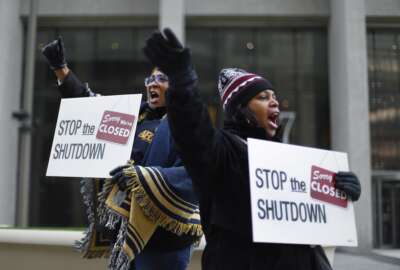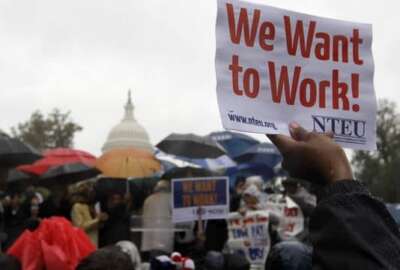

U.S. attorneys say a series of challenges from the National Treasury Employees Union on the last government shutdown should be dismissed because the union can't...
Best listening experience is on Chrome, Firefox or Safari. Subscribe to Federal Drive’s daily audio interviews on Apple Podcasts or PodcastOne.
With the threat of another government shutdown just two weeks away, a federal district court is considering whether a series of legal challenges from the National Treasury Employees Union on the last lapse in appropriations should move forward.
Those looking for a quick, timely decision ahead of the next shutdown threat on Dec. 20 will likely be disappointed.
“You’d be lucky to get an opinion in January,” Richard Leon, the judge in the U.S. District Court for the District of Columbia who’s presiding over the case, told both parties Wednesday.
NTEU’s legal arguments are nuanced, but they essentially challenge the heart of the very mechanism that ultimately prompts agencies to shut down, furlough some federal employees and force others to work without pay for the duration of a lapse of appropriations.
They also charge the Treasury Department for violating the Anti-Deficiency Act by recalling tens of thousands of IRS employees back to work to process tax returns during the last 35-day government shutdown.
But the merits of those challenges weren’t covered, as Leon only heard oral arguments Wednesday afternoon on the government’s motion to dismiss NTEU’s case.
U.S. attorneys representing the federal government argued the court should dismiss the case, because the shutdown that prompted NTEU’s initial challenge is over, they said.
The union’s case is moot, U.S. attorneys argued, because NTEU must show the court their case is “capable of repetition.” From the administration’s perspective, this means the union must demonstrate the likelihood that another lapse in appropriations — that’s nearly identical to the most recent 35-day partial government shutdown that occurred earlier this year — could reasonably happen again.
Specifically, U.S. attorneys say NTEU must demonstrate a future government shutdown would impact the same, individual federal employees in exactly the same away as the 2018-2019 lapse. The same agencies must be impacted, and those agencies must respond to a future shutdown in exactly the same way, the attorneys argued.
In addition, the union must show a future shutdown could occur at exactly the same time of year as the previous lapse. Notably in this case, NTEU must demonstrate a future shutdown could reasonably occur during another tax filing season, therefore prompting the IRS to force thousands of employees to work without pay.
Broadly speaking, U.S. attorneys said it’s not up to the court to make speculate about these events.
“The courts aren’t meant to be part of the ongoing political squabbles of the legislative branch,” Daniel Schwei, the lead attorney representing the government, said during oral arguments.
NTEU rejected the premise of the government’s argument. The union must simply demonstrate a reasonable expectation that “legal injuries” will again impact their members during a future government shutdown, Paras Shah, the NTEU attorney, argued.
Even if an upcoming government shutdown may not look exactly like the previous one, it could look awfully similar if Congress and the White House fail to secure some sort of funding deal by the upcoming Dec. 20 deadline.
“We are right where we were a year ago,” Shah said in his opening arguments.
A Dec. 20 government shutdown would, again, fall over the holiday season, near the end of a calendar year and ahead of the upcoming tax filing season.
The IRS, which updated its shutdown contingency plan back in September, said it would require 47,009 employees to work during a lapse in appropriations — if it falls during an upcoming filing season.
Shah and NTEU also pointed to a review from the Government Accountability Office, which said the IRS had violated the Anti-Deficiency Act in recalling tens of thousands of these employees back to work during the last shutdown for the purposes of processing tax returns.
A Nov. 5 memo from Office of Management and Budget told agencies to ignore opinions from the legislative branch about potential Anti-Deficiency Act violations.
For NTEU, this tension could set the stage for other agencies to get away with Anti-Deficiency Act violations.
“This is not a political dispute,” said Michael Kator, an attorney with the law firm Kator, Parks, Weiser and Harris who’s also arguing on behalf of the plaintiffs involved in the case. “What we’re asking this court to do is that for the people who are impacted by these shutdowns, these are the rules. … You cannot require people to work without pay.”
The court may eventually weigh in on these “rules,” but it must first decide whether it will dismiss the case altogether. If the court doesn’t dismiss the case, it will consider NTEU’s three original counts.
First, NTEU argued that the Antideficiency Act, which essentially prohibits agencies from spending money they don’t have, violates the appropriations clause of the U.S. Constitution. The appropriations clause directs agencies to spend obligated funds only if Congress has appropriated such funds.
Second, the union claimed OMB guidance that instructs agencies to prompts certain employees to come to work during a government shutdown violates the Antideficiency Act.




NTEU first filed these challenges back in January near the end of the longest government shutdown in U.S. history. It added a third count later, which protested the Trump administration’s recall of tens of thousands of federal employees who returned to work without pay during the partial government shutdown.
Specifically, the third count challenged the administration’s decision to recall more than 46,000 IRS employees back for work without pay. NTEU argued the IRS employees, who will return to work to process tax refunds and perform certain customer service functions, are not considered “excepted employees.”
The Trump administration recalled tens of thousands of federal employees across government during the most recent shutdown. Employees from the Agriculture Department and Federal Aviation Administration, among others, also returned to work at various points throughout the 35-day government shutdown.
The Trump administration, however, argued those decisions were simply attempts to find legal interpretations and workarounds to the Antideficiency Act and alleviate the impacts of the government shutdown to the American public.
This legal challenge is separate from a lawsuit NTEU and several other federal employee unions filed in the U.S. Court of Federal Claims during the most recent government shutdown.
That suit argued the requirement for excepted employees to work without pay during a shutdown is a violation of the Fair Labor Standards Act.
The American Federation of Government Employees filed a similar class action lawsuit during the 2013 shutdown and won. Plaintiffs involved in that suit are supposed to receive damages from the suit, but federal and union attorneys have been slowly gathering payroll data to inform the calculation of those damages for months.
To date, the parties have determined 21,781 people are eligible for damages.
Copyright © 2024 Federal News Network. All rights reserved. This website is not intended for users located within the European Economic Area.
Nicole Ogrysko is a reporter for Federal News Network focusing on the federal workforce and federal pay and benefits.
Follow @nogryskoWFED
